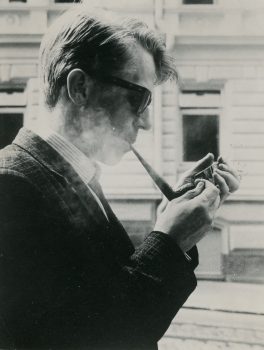Author: Pertti Lassila
The heart of reality
Issue 2/2007 | Archives online, Authors, Reviews
The experience of nature always inspired the poet Aaro Hellaakoski (1893–1952), but in his universe – composed of rhyme, rhythm and linguistic brilliance – existential questions remain vital.
Man is a being tied to an intersection. Like some creature floating helplessly in the water, he sees shadows of the infinite in the surface and senses the depths beneath the surface, but neither is within his grasp. The poet Aaro Hellaakoski often uses the surface of water, two-dimensional space, as a symbol of the fate of man. Expertise in the natural sciences and experience with research, both rare for a poet, left their mark on Hellaakoski’s lyrics; he received his doctorate in geography in 1929 and had a long career as a schoolteacher. More…
Grasping reality
30 September 2006 | Authors, Reviews
I suppose many readers, like myself, first encountered Pentti Saaritsa (born 1941) as a translator, and only later as a poet. He published a distinguished translation of Pablo Neruda’s poetry in 1964. Since then he has interpreted South American poetry, previously almost totally unknown in Finland but which has become, precisely through Saaritsa’s translations, important for many readers and writers.
In addition to Neruda, he has edited anthologies of Latin American poetry, and among writers he has translated are Miguel Angel Asturias, Gabriel García Marquéz, Fernando Pessoa, Federico García Lorca, Paulo de Carvalho-Neto and Jorge Luis Borges. More…
Mortal song
30 December 2005 | Authors, Reviews

Photo: Irmeli Jung
Names or cultural references suffice to convey meaning to the reader: classics, movie stars, brand names, myths and Joe Bloggs coexist in them. In this sense, Jarkko Laine’s poems are ‘cultural’ and testify to a belief in a shared cultural reality and in the existence of a shared civilisation. Furthermore, they assert, in an Eliotian spirit, that the canon of ‘great books’ and great works is still alive. In the manner of a learned humanist, Laine is not afraid to appear pedantic but is willing to emphasise his points with italics or footnotes whenever necessary. More…
What makes a classic?
Issue 1/2004 | Archives online, Authors, Reviews
In the bicentenary year of Finland’s national poet, Johan Ludvig Runeberg, Pertti Lassila sets his work against the background of the country’s turbulent history
The fifth of February, birthday of Johan Runeberg (1804–1877), a Finnish poet who wrote in his native Swedish, was already a patriotic festival in the 19th century; lighted candles were set in the windows of the Grand Duchy of Finland. Late in the century, the custom became a silent protest against the measures which, in the opinion of Finns, represented Russian oppression and threatened the country’s autonomy. The candle tradition later moved to Finland’s independence day, 6 December.
When, in 1904, the centenary of Runeberg’s birth was celebrated, Russian pressure meant that this was a politically uncertain and dramatic period. A crisis developed when a Finnish student named Eugen Schauman, in the June of the same year, murdered the Russian governor general, Nikolai Ivanovitch Bobrikov, in Helsinki for political reasons. Runeberg’s centenary year gathered the nation around the poet who, more than any other in Finland, was the symbol of love of the country. The first systematic translation project for the rendering of Runeberg’s work into Finnish was also in progress. More…
Experiments with reality
Issue 3/1985 | Archives online, Authors

Väinö Kirstinä. Photo: SKS Archives
Väino Kirstinä (born 1936) regards himself as a member of the ‘second generation’ of Finnish modernists. His first collection of poems, Lakeus (‘The plain’) was published in 1961, followed two years later by Hitaat auringot (‘Slow suns’) and, the same year, by the work that gained him public recognition, Puhetta (‘Talk’). In 1979 Kirstinä commented on the aims of Puhetta: ‘the work … aimed to break the mould of Finnish modernism in some senses – hermetics, for example. I tried to bring everyday language into poetry – trams and fridges alongside the familiar symbols of mountains, lakes, beaches and birds. My poetry opened up, it developed into a kind of unclean lyricism.’
His interest in words as one of the constituents of poetry is characteristic of Kirstinä’s work, as is his search for the sources of modern poetry, such as the work of Baudelaire, which he has translated into Finnish, and the later tradition of surrealism and dada, which is clearly influential in his extensive collections Luonnollinen tanssi (‘Naturaldance’, 1965) and Pitkän tähtäyksen LSD-suunnitelma (‘Long-term LSD plan’, 1967). More…
-
About the author
Pertti Lassila (born 1949) is a literary scholar, writer and critic.
© Writers and translators. Anyone wishing to make use of material published on this website should apply to the Editors.
